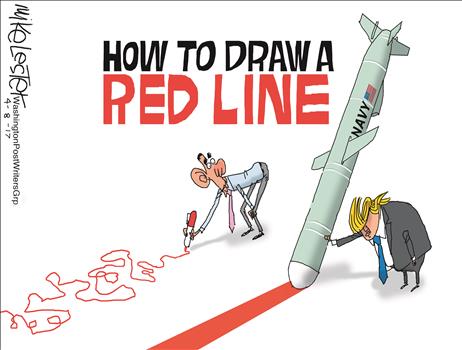
Trump has now shown himself just as willing as President Obama to make empty threats that damage American credibility. The problem with the Trump administration’s policy on Iran isn’t that it won’t go to war. It’s that it keeps constructing policies that require the use of military force to achieve objectives, when the president has repeatedly made clear he’s unwilling to take that step. The administration points a gun, but won’t pull the trigger, and that will encourage other adversaries to challenge America in other theaters.
By Kori Schake
Trump has actually done much worse than Obama did with his “red line” comment, since Obama didn’t commence operations only to then send a panicked message through an emissary assuring Iran’s leaders that he wanted negotiations instead, or publicly downplay the nature of the threat. Trump did both of these things, after providing with Congress “very strong and compelling evidence” that Iran had sabotaged two tankers in international waters. And he contradicted public, factual reports made by the military command.
The architect of this successful Iranian policy is the head of the Quds Force, Qassem Soleimani. As Michael Weiss describes him, Soleimani “is seen as the one man who outsmarted three U.S. presidents, using their own myopic policies to his farsighted advantage, starting with the invasion of Iraq, continuing onto the failure to confront Assad, and culminating in the fixation on ISIS as the sole security challenge in the neighborhood.” Soleimani must be incredulous over his victory. In the past several weeks, Iran has attacked two tankers in the Gulf of Oman; fired missiles six times at U.S. bases in Iraq; helped Houthi rebels in Yemen fire rockets at Saudi civilian airports, injuring 23 civilians; and now caused a major disruption to commerce by proving that the skies over the gulf are unsafe for passage.
The president’s reprehensible behavior makes it virtually impossible for him to bring the country together, convince it that war is necessary, and, on the basis of that support, persuade America’s allies to join the fight. The president has mostly surrounded himself—with the notable exception of Director of National Intelligence Dan Coats—with people who, either by personality or because of the provisional nature of their Cabinet appointments, are disinclined to disagree with him.
In foreign policy, and Iran policy in particular, chaos rules. There appears to be no interagency process to vet alternative approaches or include the talent from departments in deliberations on policy. National Security Adviser John Bolton doesn’t serve either as an impartial adjudicator of the interagency or as an enforcer of the president’s views; instead, he advances his own strident policies, which the president publicly rebuts. The White House is populated by figures either unwilling to restrain the president’s erratic impulses or incapable of doing so. Max Boot is surely right that the most we can expect of this dysfunctional administration is “for Trump to veer, as he has with North Korea, from irresponsible saber-rattling to oleaginous appeasement.”
The problem with the Trump administration’s policy on Iran isn’t that it won’t go to war. It’s that it keeps constructing policies that require the use of military force to achieve objectives, when the president has repeatedly made clear he’s unwilling to take that step. The administration points a gun, but won’t pull the trigger, and that will encourage other adversaries to challenge America in other theaters.
THE ATLANTIC

Leave a Reply
You must be logged in to post a comment.